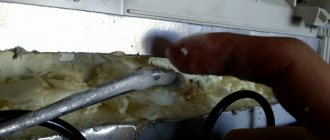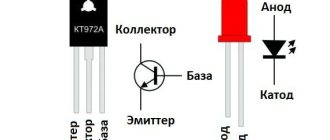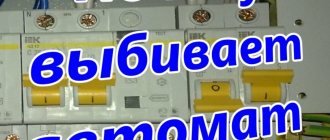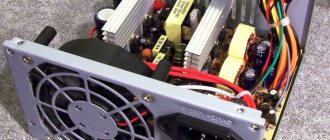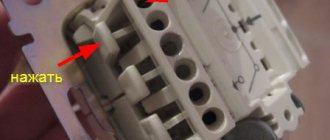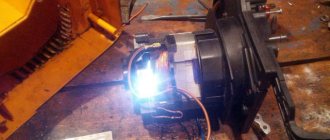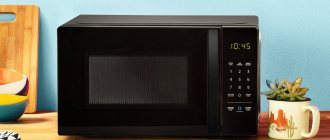Design and operating features of the refrigerator
The main functional unit of the refrigerator is the compressor; it pumps freon through a capillary pipeline through the evaporator and condenser. The evaporator is a grille with a coil, which is located inside, usually on the back wall behind the freezer or around it; in “no-frost” systems it resembles the radiator of a car heater. With its help, heat is released into the environment.
It is almost impossible to imagine modern life without a refrigerator.
The condenser is located outside the refrigerator chambers; it can be open (as in old Soviet refrigerators), or it can be closed (as in some modern models). With its help, heat is released into the environment.
The compressor does not operate continuously, but periodically. The colder the temperature inside the cooling chambers is set, the more often and longer the compressor will operate. When starting the compressor, you may have noticed how the voltage in the network sags. This is accompanied by a short-term decrease in the brightness of incandescent lamps.
When it stops, you can often hear increased noise from the device, and in old Soviet models this noise and vibration sometimes develop into a real roar. This is due to the peculiarity of the compressor design - it is an electric motor that drives a piston similar to that used in internal combustion engines.
Such a design will inevitably vibrate, so rubber feet, hangers or springs are installed under the compressor. But what if the vibration is too strong? Let's find out!
Search for reasons
To determine the severity of the problem, it is necessary to find out the reasons why the refrigerator is cracking. When the unit is working completely normally, but sometimes a cracking noise occurs, there is no point in “sounding the alarm.” Most likely, the cracking noise occurs due to temperature changes inherent in the components of refrigerators.
It is worth taking action only when the refrigerator is not functioning properly. The absence of cold and light inside the chambers, with the noise of the compressor operation, accompanied by a crackling sound, cannot be done without repairs.
The refrigerator is loud: causes and solutions
We have collected typical problems and will tell you how to fix them. Among them are:
- Incorrect installation or misplaced location.
- Overheating due to lack of air.
- Problems with the fan.
- Electrical network problems.
- Fastenings are loose.
- Problems with shock absorbers.
Let's learn about each of them separately.
Installation rules violated
The refrigerator must be level! What does it mean? If the device is skewed, its parts may touch, be in an abnormal position, the weight of the compressor is incorrectly distributed, which is why the parts may rattle against each other.
To install the refrigerator correctly, you need to take a regular building level and set it so that the device is level in the horizontal plane. To adjust the position of the refrigerator, inspect its legs - they are usually adjusted in the same way as on other household appliances, for example, on washing machines.
If the floor is uneven, then the legs of the refrigerator need to be adjusted
To adjust them, lift the adjustable side of the device and unscrew the thumb leg to increase the height, or screw it to decrease it.
Lack of air
If the refrigerator is installed close to a wall, appliances or other furniture, there may be problems with it overheating. This may cause the compressor to overload and make loud noises.
On a note! There should be at least 5-10 centimeters of free space between the back wall of the refrigerator and the nearest wall. The same applies to the side walls of the device. So pay attention to this too. This problem is especially common in hot summers.
Fan problems
In addition to the compressor, No Frost refrigerators also have two fans. One of them drives cold air through the chambers. If it is worn out, it also makes cracking sounds, uneven sounds and tapping, whistling or humming. To determine the malfunction you need to get to the fan. It is located near the evaporator. This is a radiator that is installed behind the freezer. The second fan is needed to cool the compressor, so it is located next to it - at the bottom of the device.
If your refrigerator is making strange noises, it may be the fan.
First, you need to listen to which of the fans the noise is coming from, you won’t see it, since it’s covered by a panel, but we’ve already told you where each one is. Two reasons for fan noise:
- The grease on the bearings has dried out. The most common problem is that the fan first begins to make noise, and then may completely jam. Sliding bearings are installed in them, often these are brass bushings. The easiest option is to drip some motor oil into the contact area between the motor shaft and the bearing or spray it with WD-40 universal solution. If you drip too much, the oil will start to spread all over the surrounding walls. During normal repairs of electric motors, the bronze bushings are removed and replaced with new ones. Less often, they are lubricated with thick lubricant.
- Ice freezing on the evaporator. Then the fan simply touches the ice with its blades. In a normal case, there should be no ice; if there is, check the defrosting system; it consists of several temperature sensors, a control system (for example, an electromechanical timer) and a heating element. If the timer, control relay or heating element malfunctions, the ice is not removed. Also, when No Frost refrigerators operate for a long time, sometimes the ice is not completely removed during defrosting and gradually accumulates. Defrost it at least once a year.
Electrical fault
The hum may come from the compressor motor if there are problems in the electrical circuit of its power supply. Especially if the start-protection relay fails. This is an electromechanical (most often) device that connects the windings of an electric motor in a certain way and starts it. When the rotor is jammed, interturn or short circuit occurs, the circuit is opened and restart is prevented for some time.
The refrigerator may make noise if there is a short circuit
This ensures thermal and current protection. Sometimes a posistor is used instead of a relay. With such malfunctions, repeated engine starts and stops with characteristic vibrations and noise are observed.
When noise is a sign of breakdown
If the refrigerator hums but does not start, everything is very clear. Here you can only turn off the power to the device and call a technician or contact Midea ASC under warranty. But much more often, the refrigerator continues to work after the noise appears, and in many cases even without deteriorating the quality of cooling and freezing. However, in such a situation, it is also important to unplug the refrigerator before the problem gets worse. The table contains all the problems that are accompanied by an increase in the volume of the device.
| Description | Problem | Solution |
| Increased noise when the compressor turns on. The periods of compressor operation themselves become longer. | Wear of the compressor, which causes backlash in parts, accompanied by noise. Also, when worn, decompression occurs (pressure decrease), efficiency drops and the motor runs longer. | Contact ASC Midea. |
| The noise becomes louder at the beginning and end of compressor operation. | The compressor shock absorber springs have weakened, causing a jerk when starting and stopping. | Contact ASC Midea. |
| Extraneous notes appear in the noise: the refrigerator cracks or creaks. | The motor mounts are loose. During operation, it begins to come into contact with the body, making metallic sounds. | Contact ASC Midea. |
| The refrigerator clicks, growls, beeps and makes other sounds that are unusual for it. | The starting relay malfunctions, sometimes due to oxidation of the contacts of the electrical circuit. | Contact Midea ASC to replace the relay and clean the contacts. |
| A refrigerator with no frost hums, makes a rustling or grinding noise. | The fan makes noise. This may occur due to drying out of the lubricant in the bearings or the freezing of a layer of ice on which the blades cling. In the second case, two malfunctions are possible:
| Contact ASC Midea. |
Transport bolts and compressor mountings
The compressor vibrates strongly during operation, and manufacturers, wanting to reduce the assembly time of devices, abandon bolts and use fastening by bending parts of the housing. This fastening is weakening. Experts recommend tightening the compressor mount, or even securing it additionally with wire or cable ties to reduce vibrations. If the fastening is bolted, try to tighten them.
On a note! When purchasing a new refrigerator, you need to carefully read the operating instructions - it should say that before turning the device on, you need to unscrew all the transport bolts of the compressor, because they can also lead to increased noise levels.
Problem with shock absorbers
If the compressor were simply placed on the refrigerator chassis, the vibrations would be such that it would be easy to confuse it with a good drill. But the engineers took care of our nerves and installed the compressor on rubber shock absorbers, but over time they crack or tear. As a result, the metal parts of the housings come into contact and vibration or metallic clanging occurs when starting and stopping the compressor.
If there is noise when starting or stopping, the shock absorbers are not securely fixed.
It crackles but doesn't work
- The reason why the Atlant refrigerator is crackling but does not turn on may be a malfunction of the thermostatic relay. At the moment of switching on, this node sends a command to the control module, which causes the motor to start. Clicks when the thermostat starts up are present in any case, but when the relay clicks and the refrigerator does not turn on, it means that the reason is 92% there.
- Why does the Hotpoint Ariston refrigerator crack? It happens like this: there is a click inside, the engine starts to start, but after a few seconds it stalls. This process may be accompanied by a loud, dull hum for a certain period of time. In this case, most likely the problem is in the motor-compressor, which needs to be replaced.
- The relay is one of the first mechanisms that comes into operation when the equipment is turned on. If you hear clicks, the refrigerator does not turn on, and the light in the compartment does not light up, most likely the problem is in the protective relay.
- In some cases, noise-causing clicks emitted by one of the refrigerator components are heard when it is turned off, when the motor stops. At the same time, all departments of the refrigerator continue to operate in accordance with technical indicators, and there are no problems with the internal lighting of the departments. In this case, there is reason to suspect that the motor mounts have become loose, and when it stops, the unit comes into contact with the body, which causes sounds like clicks to appear.
Expert advice
Most modern refrigerators make noise up to 40 dB during operation, which is quieter than a human conversation. If you want to avoid annoying noise from your refrigerator, remember these 7 tips:
- Remove all shipping screws, or have a professional install it correctly.
- When purchasing, install the device evenly using a building level or plumb line using a thread and sinker.
- During operation, once every 1-2 years, be sure to wipe the dust from the back wall of the refrigerator if an open condenser is installed on it - this will facilitate heat generation and significantly reduce the load on the compressor. Accordingly, it will last longer.
- Even No Frost needs to be defrosted once every 6-12 months. This will prevent ice from accumulating on the system elements.
- Load the shelves evenly; the lids of the pots should be properly closed so as not to rattle during operation.
- Cellophane packages may rustle if they are placed against the air duct deflectors.
- Uneven loading can lead to distortion of the entire device. Distribute food evenly over the entire available area.
Watch a video about the causes of refrigerator noise
